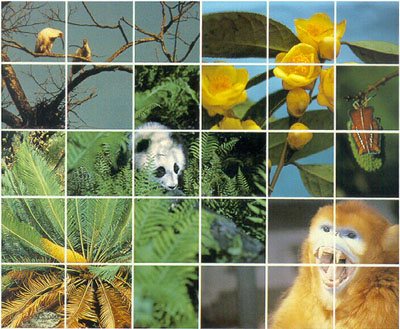China: one of the megadiverse countries
China has rich biodiversity, boasting the largest number of bird species and gymnosperm varieties in the world. But China's biodiversity is faced with a critical situation: 15 to 20 percent of higher plant varieties are endangered, threatening the existence of 40,000 species of organisms related with them.

As one of the earliest contracting country to the Convention on Biological Diversity, China has been active in international affairs concerning the Convention and vocal on important issues related to biodiversity. China is also one of the few countries to complete the Convention's action plans. The China Action Plan for Biodiversity Conservation implemented in 1994 provided rules and regulations for a lot of eco-environmental protection activities.
Being one of the megadiverse countries, China is home to approximately 6,347 species of vertebrates, including 581 animal, 1,244 bird, 376 reptile, 284 amphibian, and 3,862 fish species. Well-known among them are giant panda, golden monkey, South China tiger, Tibetan antelope, baiji and Chinese alligator. China has more than 30,000 higher plants, ranking third in the world after Brazil and Columbia. China also harbors many endemics, with about 667 endemic vertebrates and 50% to 60% of the 30,000 higher plants in China also endemic. China possesses almost all ecosystem types: agricultural, forest, inland water, marine and coastal, dryland and semi-arid, mountain and island.
The main threats to biodiversity in China include: overconsumption of wild animals and plants; destruction and overexploitation of habitats; lack of protection of some wild animals and plants; invasive alien species; deforestation; pollution; and overuse of land.
Measures taken in China
Emphasizing effective protection of biological resources, relevant government departments have built and put into operation facilities for preserving genetic resources. In January 2003, the Chinese Academy of Sciences initiated a project of saving endangered plants with an aim to increase the plant varieties from 13,000 to 21,000 under the protection of its 12 affiliated botanic gardens within 15 years and to build a botanic garden covering a total area of 458 sq km, which will be the largest in the world. In this project, over 300 million yuan will be invested in collection of rare and endangered plants, and genetic banks will be built with the Qinling Mountain, Wuhan, Xishuangbanna and Beijing as the centers.
To help save endangered wildlife, 250 wildlife breeding centers have been established throughout the country, and special projects have been carried out to protect seven species, including giant pandas and red ibises. At present, the wild population of the giant panda remains at more than 1,000 in continuously improved conditions. The red ibis population has increased from seven to over 560, relieving that bird's endangered situation. The population of artificially bred Chinese alligators is nearly 10,000. The population of Eld's deer has increased from 26 to more than 800.
The population of relic gulls has increased from 2,000 to more than 10,000. Sightings of tigers rarely seen in recent times have been reported in the northeastern, eastern and southern parts of China. Construction began in October 2003 for a nature reserve for white-flag dolphins, one of the most endangered animals in the world, in Zhenjiang on the lower reaches of the Yangtze River.
After persistent combat against poaching in cooperation with many international animal protection organizations, the population of Tibetan antelopes, which had shrunken sharply because of poaching, now remains at about 70,000.
In 2010, inauguration of Action in China for the 2010 International Year of Biodiversity was held in Beijing on January 26.
 0
0 







Go to Forum >>0 Comments